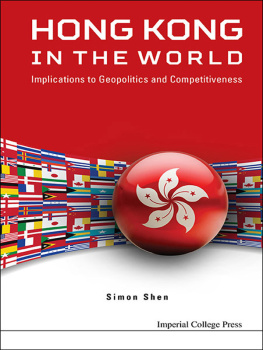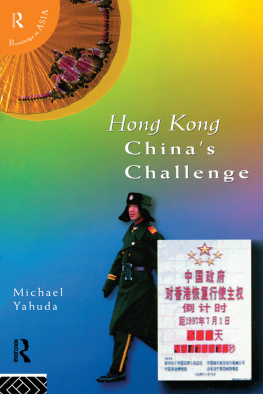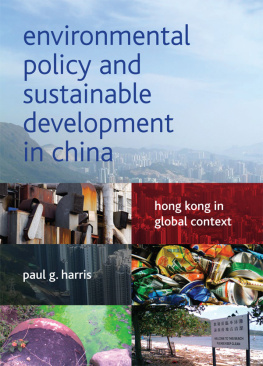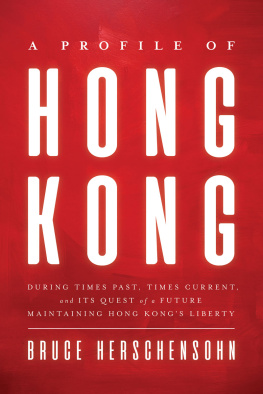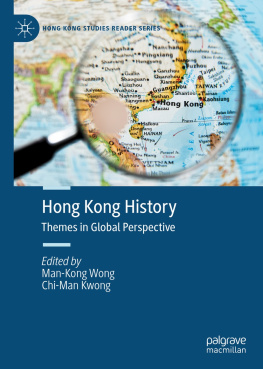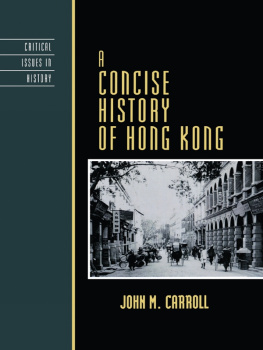Table of Contents
Landmarks
Pagebreaks of the print version


Published by
Imperial College Press
57 Shelton Street
Covent Garden
London WC2H 9HE
Distributed by
World Scientific Publishing Co. Pte. Ltd.
5 Toh Tuck Link, Singapore 596224
USA office: 27 Warren Street, Suite 401-402, Hackensack, NJ 07601
UK office: 57 Shelton Street, Covent Garden, London WC2H 9HE
Library of Congress Cataloging-in-Publication Data
Names: Shen, Simon.
Title: Hong Kong in the world : implications to geopolitics and competitiveness /
Xu Hui Simon Shen, the Chinese University of Hong Kong, Hong Kong.
Description: New Jersey : Imperial College Press, [2016] |
Includes bibliographical references and index.
Identifiers: LCCN 2016023407 | ISBN 9781783269372 (hardcover : alk. paper)
Subjects: LCSH: Hong Kong (China)--Politics and government. | Geopolitics--China-
Hong Kong. | Hong Kong (China)--Foreign relations. | Hong Kong (China)-
Foreign relations--China. | China--Foreign relations--China--Hong Kong.
Classification: LCC JQ1539.5.A91 S42 2016 | DDC 327.5125--dc23
LC record available at https://lccn.loc.gov/2016023407
British Library Cataloguing-in-Publication Data
A catalogue record for this book is available from the British Library.
Copyright 2016 by Imperial College Press
All rights reserved. This book, or parts thereof, may not be reproduced in any form or by any means, electronic or mechanical, including photocopying, recording or any information storage and retrieval system now known or to be invented, without written permission from the Publisher.
For photocopying of material in this volume, please pay a copying fee through the Copyright Clearance Center, Inc., 222 Rosewood Drive, Danvers, MA 01923, USA. In this case permission to photocopy is not required from the publisher.
Editors: Siwei Huang, Kalvin Fung, Judy Lee and Carol Dyer
Printed in Singapore
Preface
A Dimming Pearl of the Orient or the Revival of Port City Diplomacy?
For a long time, Hong Kong has been at the centre of the international political economy, from the early treaty port system to the recent Panama Papers scandal. However, the relative importance of Hong Kong in international relations does not match with the lack of related studies in academia. While literature exists which relates to Hong Kongs potential role in Chinese foreign policy under the one country, two systems framework, there has been little interest among international and local academia in the external relations of Hong Kong over the last ten years. Indeed, if not for the Umbrella Movement in 2014 and the Fishball Revolution in 2016, the international world, the author argues, might no longer be interested in Hong Kong studies, especially those related to its external relations.
The lack of studies in recent years, however, should not be allowed to diminish the importance of the subject. This short preface will, therefore, deconstruct the academic importance of Hong Kong external relations into three component parts: the global, the national and the local; discuss the relative importance of the subject; and explain the structure of the book.
The Three Important Dimensions to Hong Kong External Relations
Global: Paradiplomacy and Its Constraints
While the classical definition of paradiplomacy always refers to the highest level of personal and parallel diplomacy, complementing or competing with the regular foreign policy of the minister concerned,
Given the enduring contribution of Hong Kong from the Cold War to the New Cold War, a term used to describe Sino-American relations, a study of international politics therefore sheds light on paradiplomacy in practice. Especially from the well-perceived realist orientation of China under Western scholarship, Chinese foreign policy is assumed to be holistic under the leadership of the Communist Party. However, the monolithic assumption of Chinese foreign policy is challenged if we take Hong Kong external relations into account. The special political and institutional status of Hong Kong in the context of greater China and the world shows what potential sub-national entities can achieve, while the quasi-federal nature of one country, two systems also sheds light on the limitations of PITs under an authoritarian regime, a situation which current Western scholarship has not reviewed.
National: Multi-layered Chinese Foreign Policy in Practice
From the Chinese scholars perspective, however, the term paradiplomacy may not be the best to conceptualize the innovation of Chinese foreign policy in recent years. Instead, they borrow the multi-layered perspective from the public policy school in describing the dynamics of provincial government and central government in the foreign-policy-making process. The slight difference between paradiplomacy and a multi-layered foreign policy system is that while the former treats the sub-national regime as an independent actor in international politics, the latter suggests that the sub-national regime is a part of the multi-level policy process needed to be gone through in policy making, but is not an independent actor working in parallel with the nation state.
This perspective sees the involvement of sub-national regimes in foreign policy making and practices as a natural evolution and expansion of foreign policy.
Under one country, two systems, Hong Kong is perceived to have more autonomy than traditional coastal provinces or cities like Guangdong The changing role of Hong Kong can therefore be seen as a point of reference when analysing the current foreign policy shift in China and in the years to come.
Local: Revealing the True Identity of Hong Kong
Last but not least, bringing Hong Kongs potential regarding its external relations back into the limelight is essential for Hong Kong studies to flourish. In evaluating the sincerity of the promises stipulated by Beijing under one country, two systems, local and overseas scholars tend to evaluate the situation from the increasing presence of Beijing in domestic politics and the decline in freedoms and rights enjoyed by civil society,little evaluation is made from the perspective of external autonomy. Yet under one country, two systems, while Article 13 of the Basic Law has laid down Beijings responsibility in handling foreign affairs related to Hong Kong, Chapter VII of the Basic Law further defines the power and to autonomy enjoyed by the Hong Kong Special Administrative Region Government, and its officials, its relations with external parties, its ability develop relations with other international entities, conclude international agreements and participate in international organizations in appropriate fields, under the name Hong Kong, China. This external dimension of Hong Kong is the fundamental part of its identity that both China and the world wish to maintain. The only question that remains is what kind of identity does Hong Kong now have since colonial rule ended and sovereignty was handed over in 1997? By studying a number of bilateral and multi-lateral cases involving Hong Kong, it is hoped to shed light on this question with the introduction of the concept of port city and port identity.
Organization of the Book

